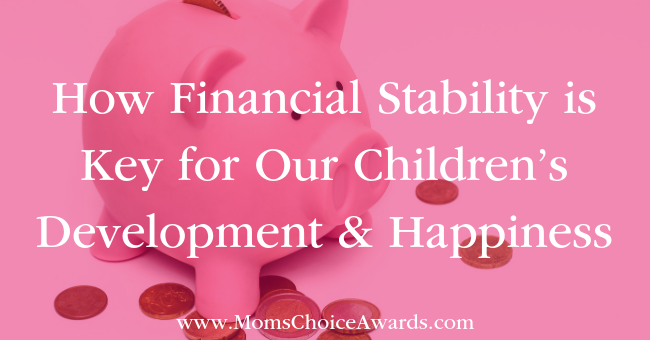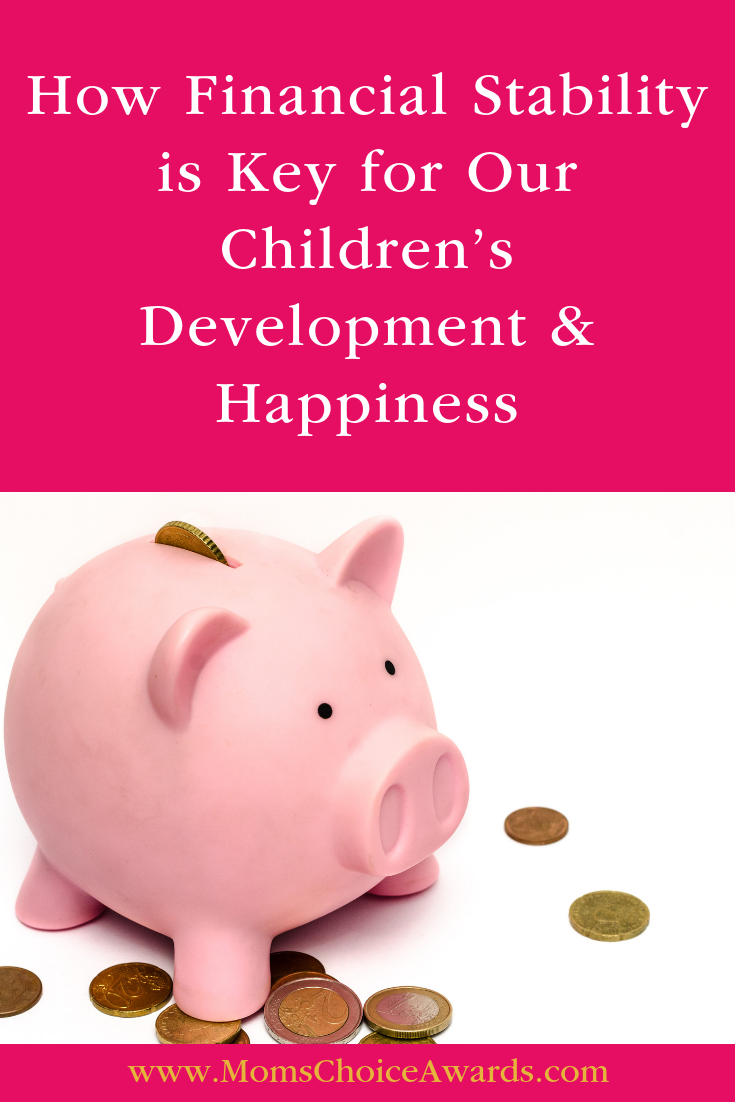 Kari Lorz
Kari Lorz
Blogger | Mom
Pinterest | Facebook
Everyone knows that having money is useful, and not having money is very hard. Duh! Yet do we (as parents) fully understand how money plays a part in our children’s lives beyond just being able to buy them toys? Financial stability sounds like a boring topic, yet we as parents should care DEEPLY about the end result; having a happy, healthy and well-adjusted child. However, we may not always equate money with these traits. If you are looking for a nudge to get your finances in order then this is it, because financial stability is a critical component in your child’s development!

Financial Stability – what it is and what it isn’t
Before we go too deep into the topic of money and child development, I want to highlight a critical point. I am talking about “financial stability”, not in being well off or having a lot of money. You can totally raise healthy & well-adjusted children while being in a low income earning household, and I am in no way disregarding that. I am highlighting here that being in any income earning level, where money fluctuates drastically is causing stress on the family dynamic. You don’t have to be “poor” to feel money problems, and if your considered “rich” your problems certainly don’t go away.
In my own nontechnical terms, financial stability is being able to meet the basic needs of the household consistently, and being in a comfortable state where you are not constantly worried over whether or not you will be able to meet those needs in the immediate future (aka when next months bills are due). This dollar figure is unique to each family and changes over time.
Socioeconomic status vs. financial stability
We cannot deny that having a certain level of income does indeed help things. The American Psychological Association states that “Socioeconomic status (SES) encompasses not just income but also educational attainment, occupational prestige, and subjective perceptions of social status and social class. Socioeconomic status can encompass quality of life attributes as well as the opportunities and privileges afforded to people within society…” (source) Which is a fancy way of saying that more than just money comes into play. You can influence some of these things by behavior, actions, and drive, it’s up to the individual.
Even though they are talking about “low socioeconomic status” I am going to take some of these issues and argue that they are prevalent in households that have a hard time being financially stable (not just low income earning).
Familial problems based in money – parental relationships
There’s no denying that money plays a significant role in a marriage/relationship. Money problems are commonly stated as being the 2nd highest cause of divorce in the US (ranked just behind infidelity). While it is ranked as being the leading cause of stress in a relationship. (source)
When individuals are stressed they bring that into the relationship, and it is very common for partners to have different spending habits, which can create tension and resentment. One is a saver and another is a spender. Or one partner makes significantly more than the other. Or any number of variants.
Arguments – you’re doing it wrong
When these issues continue to build, and if the couple doesn’t have an open communication pattern these issues boil up and arguments happen. Now, every couple has disagreements, almost all couples argue, that’s just what happens. Yet it’s how you disagree is what matters in the long run. Nancy Cahir, PhD, says that “…Because the children learn from how the parents handle conflicts. If the parents can learn to control anger and not to blame the other, their behavior becomes a model the child can learn from.” (source)
When disagreements escalate to fights and continue on that path without a solution in sight is when people consider and get divorced. (A lot of other reasons can play into this as well, yet generally speaking, money plays a good sized role).
Fights among parents cause stress for the children, even if they aren’t directly involved. Kids are intuitive; they pick up on when things are right. Behaviors learned while we are young last long into adulthood. Having heated arguments may lead to children feeling anxious, stressed, feelings that they are responsible, depression and lack of trust or feeling safe.

Rebecca A. Jones, PhD, associate professor of clinical psychology at the Georgia School of Professional Psychology in Atlanta says that “They need to be shielded from conflicts that are too much for them to understand. If they do witness arguments, it is very important that they see their parents resolve those conflicts and compromise. Because that is how children learn that conflict is normal and healthy if resolved through communication.” (source)
Separation & divorce effects on kids
Now I don’t need to spout statistics at you; everyone knows that families (for the most part, there are always exceptions) are healthier when the parents are together in the same household. There’s more support for the spouse, more individualized attention with the children, a greater chance of financial stability with two working-age adults. Or even one traditional 9-5 worker, and one familial caregiver. Two adults caring for children is easier than just having one adult in the home.
I want to talk about the secondary impacts of separation and divorce. These instances mean that children may also need to navigate a new household with custody transitions, maybe a new school which means loss of friends. They may feel that they are viewed by their friends as being “different”. It may also break their sense of trust with their parents, or increase anxiety about losing the other parent. Unbalance is their new normal, and it’s hard for children to thrive in that type of environment.
Other aspects of their life may change as a result, such as change of routines, no more soccer practice because of drop off transitions. Or no more Sunday breakfast with Dad, because Mom has the kids on the weekends, etc.
Now don’t get me wrong, sometimes divorce is for the best for both the parents and the children for any number of reasons. I support people choosing for themselves and their individual situation. Yet being aware of its impact on your children should be utmost in your new life.
Strong family but a broken lifestyle
At other times there are families where there are two loving parents in the picture and money isn’t a cause of disagreement. If as a family you are struggling, your children may experience the fear of losing their home, their possessions, and being different from their friends. They may just be scared of everything, which can be hugely detrimental to their development.
Parents should try and seek help (see below) and put their family’s well being first. This won’t be easy but it is absolutely worth it!
4 steps to being financially stable
There are a few keys things that you can do to help your family have financial stability.
1. Have a good communication style with your spouse
This is the number one thing you as an adult can do to better your situation! Be comfortable talking about money without arguing or blaming. This is an easy say but hard do for many, yet you will only get better at this with practice.
- talk about your goals and dreams for your family’s future
- admit that you need help figuring it out, you need a partner
- own up to your own mistakes
- talk about how you want to contribute (and try to stay away from about how you feel your spouse “should” contribute)
- celebrate the wins, no matter how small
- get on a plan! Adjust, tweak and refine but don’t give up!
- listen and try your best to understand where your spouse is coming from
- talk about money in front of your children. Don’t hide the topic, but talk about an aspect of it that is nonthreatening such as “we got a great price on the new bicycle!”
- offer grace to your partner and yourself; no one is perfect
2. Have an emergency fund!
Time and time again studies find that most Americans cannot cover a financial emergency; be it a job loss, medical emergency, housing change, etc. In fact, Money Magazine reported on a report from the Federal Reserve that 40% of Americans could not cover a $400 financial emergency without borrowing or selling something! (source).
It’s okay to start small! Start with saving $20 a week, then build from there. The best way that you can save money is the strategy to pay yourself first! Time and time again we plan to save whats left at the end of the month. Guess what… there’s usually nothing left, so flip the plan! You can read all about it…
3. Spend Less Than You Earn!
This is one of the easiest mathematical formulas, it’s addition & subtraction. Yet, it’s the number one struggle for families, no matter your income level. This is where having a solid budget comes into play. Make sure that you have one that makes sense to you, and if the one you have doesn’t work then find a new one! There are many ways to budget (zero-based budgeting, budget by paycheck, cash envelope system, etc.). Just don’t give up on it because “it doesn’t work”. It’s hard, there’s no doubt about it, but it can be done.
When I budget I include sinking funds to help make sure even unplanned expenses are covered!
4. Give it 15 minutes a day!
Commit to Learning, even if it’s just 15 minutes a day to start with, start reading about money; be it blogs, following people/groups on social media, listening to podcasts is how I started. Just being exposed to people talking about money management strategies will start your own wheels turning. Some of it will be overwhelming, and you may not even know what you don’t know (I started there). Over time these bits of information will begin to tie together and make sense. Just like any other skill you learned, it takes time, exposure & practice.
Know when to seek help
If you find that you are sinking lower and lower with your finances please find a way to seek help. It’s so odd that such a common issue in our society is one still filled with stigma and negative connotations. Please don’t waste time feeling ashamed or guilty. Seek help! Many churches run the Dave Ramsey Financial Peace University programs which are hugely successful! Or there may be some non-profits in your area that help people just like you and me. Or talk with a trusted friend, you may find that they too struggled with money.
If you are interested in learning more about Dave Ramsey’s teachings and don’t want a class like setting, check out some of his books, (they were the first personal finance books that I read). If you need some convincing on his program and like case studies, then check out The Total Money Makeover: A Proven Plan for Financial Fitness. Or if you want to cut the fluff and get straight to the actionable steps, then Dave Ramsey’s Complete Guide to Money is for you. Happy reading!
If you find that your budget isn’t working check out my free resource for commonly missed budget items to help make sure your budget is complete!
It’s time for you to take back your life, and eliminate money worries from stealing the joy from your life and your family’s time together!
At the end of the day
Having financial stability will help you and your partner create a steady and more balanced environment for your children (duh, again!). You can then spend your time and energy on building great memories with your kids and experiencing things together (hello camping!). You can even help set them up for success by opening a 529 college savings account, or you can help them learn about how to manage their money with allowance/chore programs.
Overall, no matter your situation or income level, being financially stable is one of the greatest gifts that you can not only give yourself and your partner but to your children as well. It’s not about buying them “all the things”, it’s about providing a secure home where your children can grow and thrive.
Resources Mentioned:
- Dave Ramsey – Financial Peace University
- Dave Ramsey The Total Money Makeover
- Dave Ramsey’s Complete Guide to Money
This post was originally posted on Money for the Mamas blog.
 About Kari Lorz
About Kari Lorz
View all posts by Kari Lorz here.







3 Comments on “How Financial Stability is Key for Our Children’s Development & Happiness”
Thank you for the well-explained information. It’s really helpful that there are articles like this to help how we handle it. Keep sharing.
Thank you for your feedback! We will definitely keep sharing!
Thanks for the advice!